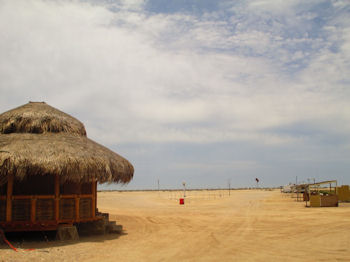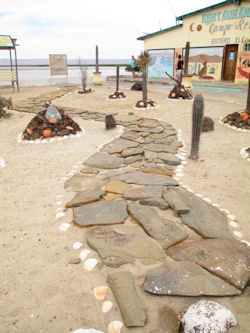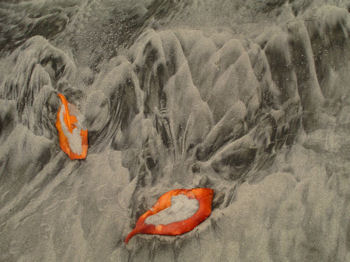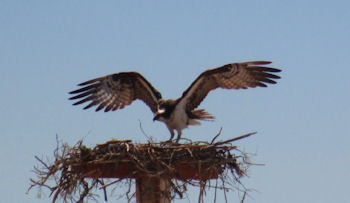 |  |
By Martina

Campo Rene is a great destination south of Guerrero Negro on the Pacific Ocean. Traveling into Baja Sur and through the Vizcaino Biosphere Reserve, you spot the turn off for Abreojos. The road is paved almost all the way to Campo Rene, but watch for the pot holes! Locals know it as the coolest place to hang out when the summer gets blistering hot on the Gulf of California and the snow birds have discovered it as a less populated refuge during their winters. Also known as Laguna la Escondida it is part of a meandering mangrove watercourse that attracts shore birds in abundance. Perched on the edge of the estuary and the Pacific Ocean, Campo Rene is the best of two watery worlds. The area was named after its four-legged visitor, coyote, that frequents the estuary. Their excited chatter can be heard in the evenings when their hunt is successful.
Campo Rene and the surrounding area has something for almost everyone. Long open stretches of beach and sand dunes seem to go on forever with not a soul in sight, except for the friends you brought along. Kayaking through the mangroves and bird watching make for a very special and peaceful entertainment for the whole family. A convenient boat launch into the estuary gives you access to the Pacific at high tide.  If you happen to have a small plane, there is even an airstrip for your convenience. You can investigate the local oyster beds and talk to the fisherman who tend them. Ah, fresh oysters on the half shell. Or if you like your food cooked, try out Rene's restaurant that features big plump fish tacos Baja style. Enjoy the view and abundant bird life from the patio.
If you happen to have a small plane, there is even an airstrip for your convenience. You can investigate the local oyster beds and talk to the fisherman who tend them. Ah, fresh oysters on the half shell. Or if you like your food cooked, try out Rene's restaurant that features big plump fish tacos Baja style. Enjoy the view and abundant bird life from the patio.
The beach is a favorite place for sand dollar collecting or a run with your dog. Please, no ATVs, as the beaches in southern Baja are often nurseries for the leatherback turtle babies. Each year the leatherback undertake an epic migration of nearly four thousand miles. They feed in the open sea at depths of 4,200 feet, deeper than any other turtle and can stay down for up to 85 minutes. If they are lucky enough to grow to full size, they will reach 7 feet long and weight up to 2,000 pounds. After the mating season, the female comes to lay her eggs in the warm sand; very few hatchlings will survive the predictors that await. And the hazards are many at this stag, which includes motor vehicles driving on the beach.
Baja Sur is well known for its estuaries and mangrove hideouts. For bird lovers you cannot beat the amazing experience of seeing such a rich abundance of species that are sometimes seen only in your bird book. A rare sighting of the ibis, long legged and curved beak is a thrill. The majestic osprey is abundant. Building nesting-poles is thoughtful support and keeps nests off electric poles. They are the sea hawk, the indigenous call them the water eagle. They hover high over the water, suspended in air and diving down, skim the surface and the sharp talons hook a prize fish. The angler has to ask, who is the finest fisherman of them all?
For the artist and photographer the search might be at the micro level, as the open terrain has little for skillful framing of shots and landscapes. But it is guaranteed that the creative eye can catch surprising detail.  Miles and miles of fascinating sand art is not disturbed by a footprint. In nature's unique display of sweeping patterns, created by the movement of the receding tides, golden leaves become sailboats in the camera's eye.
Miles and miles of fascinating sand art is not disturbed by a footprint. In nature's unique display of sweeping patterns, created by the movement of the receding tides, golden leaves become sailboats in the camera's eye.
If you need provision, just a few minutes down the main road is the small fishing village of Abreojos. It is located near the entrance of Laguna San Ignacio, one of the popular gray whale birthing lagoons, during the months of January through April. Abreojos means "open your eyes" which refers to the tricky sailing conditions with rocks and reefs. The little town has a few hundred homes, small grocers and hardware, as well as a medical clinic in case of an emergency. According to Puntas Abreojos, an online fishing report, the water here is teeming with California spiny lobster and abalone. Like Asuncion just north, there are very strong fishing cooperatives. These fisherman have carved out a niche on the international market, while at the same time protecting and preserving this sensitive region from poaching.
Surfers know this area for its exposed right point break and its consistent surf. Summer, of course, offers the best conditions, where "swells wrap in from the south and west." Windsurfers take advantage of the predictable afternoon winds from the northwest.
Utilizing the lodging and camping at Rene's allows for longer stays. The wide open spaces are abundant for RV or tent camping. Some of the sites have palapas, tables and barbeques.  There are small basic cabanas for rent to shelter from the predictable afternoon winds off the sea. Most recently, two very nice cabanas have been built for just a bit of "glamping," a union of camping and glamour. Prices range for camping from $150 pesos (appx USD $11.50) to glamping in a cabana for $500 pesos (appx USD $38.40).
There are small basic cabanas for rent to shelter from the predictable afternoon winds off the sea. Most recently, two very nice cabanas have been built for just a bit of "glamping," a union of camping and glamour. Prices range for camping from $150 pesos (appx USD $11.50) to glamping in a cabana for $500 pesos (appx USD $38.40).
Traveling from Ensenada, a suggested time line would be six hours to Catavina to visit the boojum and cardon forest. The next day, five to six hours to Campo Rene. It is paved all the way, except for the last mile or so. The road runs alongside the airstrip, watch for blowing sand dunes.
Martina's email: mteomaya(at)gmail.com